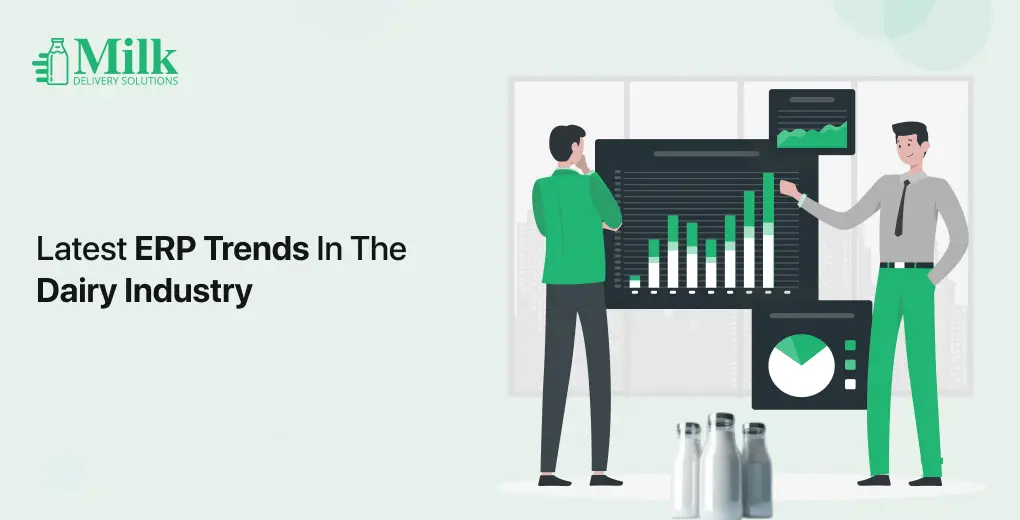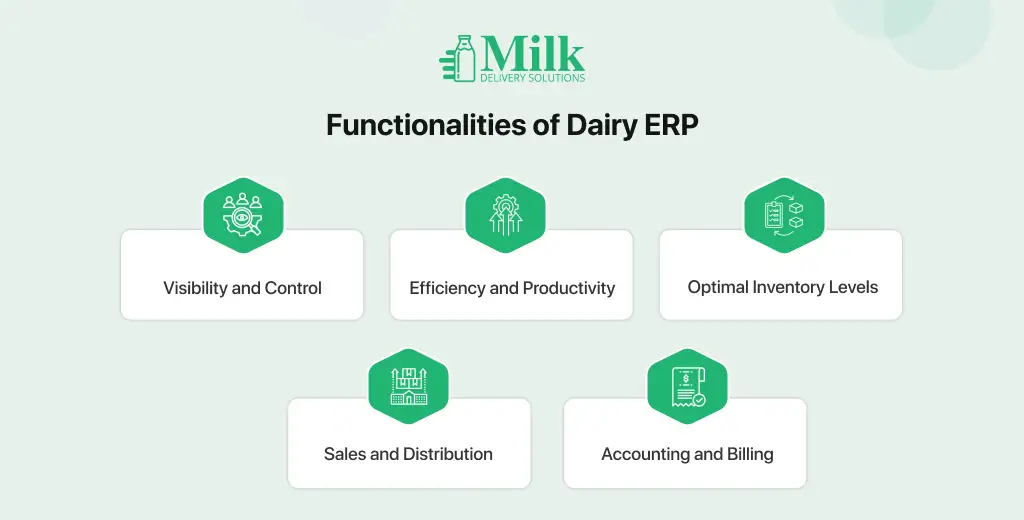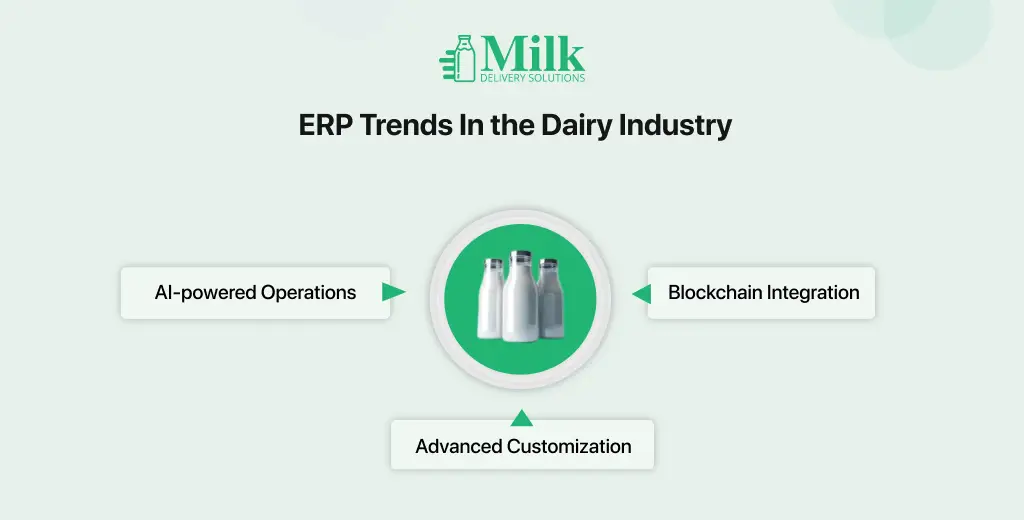Latest ERP Trends in The Dairy Industry

The dairy industry is one of the most dynamic industries, and adjusting to these disruptions can be challenging. The milk supply chain is highly complex and associated with strict regulatory compliance. The enterprise resource planning (ERP) platform automates processes to improve operations and gain business advantage.
Milk Delivery Solutions offers dairy ERP platforms to address core issues, connecting business processes like procurement, production planning and scheduling, inventory, finances, and deliveries.
What is ERP?
An ERP (enterprise resource planning) is an end-to-end dairy business software that automates and streamlines operations to improve efficiency and productivity. The dairy ERP provides multiple business applications or modules to manage various operations.
It includes operations, such as procurement, production planning, quality control, inventory management, warehouse management, supplier relationship management, packing, delivery planning, sales and distribution, and finance and accounting.
How is ERP evolving in the dairy industry?
The Dairy industry faces various challenges, like dynamic milk production (due to seasonal and weather conditions), low shelf-life of milk inventory, strict industrial regulations, and other supply chain and logistical disruptions.
ERP offers advanced features and functionalities to improve dairy operations. It is a centralized database that stores all your dairy business data in a single place. The ERP for dairy optimizes milk production, streamlines inventory management and distribution, and complies with industrial regulations. The functionalities of dairy ERP are:
Visibility and control
ERP offers real-time operational visibility, allowing you to monitor production, quality assurance, and finances. This empowers business owners to identify disruptions and make informed decisions to solve dairy bottlenecks.
Efficiency and productivity
The system automates and streamlines manual tasks, removing the need for paperwork and chances of data duplications while fostering improved efficiency. Streamlining processes can enhance operational productivity, empowering you to produce more in the same time. This allows you to cater to more customers.
Optimal inventory levels
The inventory module of ERP automates stock counting and procurement, ensuring that you have sufficient stock to fulfill customer demands. This prevents stockouts and overstocking, which can lead to financial losses and dissatisfied customers.
Sales and distribution
Milk delivery businesses implement subscription-based scheduled delivery models. Customers can place their orders from a mobile milk delivery app. They can choose their preferred products, delivery frequency, schedule, and the number of deliveries. The system provides delivery planning and route optimization features that ensure timely and accurate deliveries. This ERP software for dairy can plan your multi-stop deliveries and optimize routes with multiple addresses.
Accounting and billing
The accounting module of ERP can help you manage, track, and monitor business finances, such as transactions, payables, receivables, and expenses. The system automatically generates invoices based on the defined billing cycle. The dairy ERP software supports prepaid, postpaid, and hybrid payment models and multiple payment gateway integrations.
Latest ERP trends in the dairy industry
The ERP market is continuously evolving and expanding and its adoption is expected to grow significantly in various industries, including dairy, in the coming years. The global ERP software market size was estimated at USD 64.83 billion in 2024 and is anticipated to grow at a CAGR of 11.7% from 2025 to 2030.
The rising demand for ERP and innovations has led to significant technological advancements, enhancing business efficiency to manifold. The latest ERP trends for the dairy industry are:
AI-powered operations
ERP uses artificial intelligence and machine learning to analyze data, automate tasks, and offer actionable insights to enhance operational efficiency, decision-making, and overall dairy business. AI-powered ERPs focus on streamlining all the core business aspects, including:
- Operations – AI can automate repetitive tasks such as data entry, financial transactions, and basic customer service inquiries, empowering your employees to work on more strategic tasks.
- Data analysis – ERP leverages AI to run algorithms to analyze large datasets, and identify patterns, trends, and abnormalities.
- Forecasting – The AI ERP can analyze historical data and current trends to forecast demand, sales production needs, and potential risks, enabling businesses to address challenges in real-time and ensure seamless operations.
- Decision-making – The system provides real-time insights and prediction, empowering businesses to make prompt decisions across various operations of the milk supply chain.
Advanced customization
The ERP offers advanced customizations to meet specific dairy business needs, enabling third-party integrations, developing extra business modules, or customizing the existing ones. The ERP provides next-level customizations, ensuring the system fits your business. Types of customizations ERP offersare:
- Functional customization – Involves modifying or adding additional functions to the standard module to align the system with your business.
- Integrations – You can connect ERP systems with other business applications, such as CRM, e-commerce platforms, and herd management systems.
- Custom module development – Involves building a new module that is unavailable in the standard ERP.
- UI customizations – You can tailor user interfaces for a milk delivery app for customers and a milk delivery driver app, making it easy for them to use.
Blockchain integration
Integrating blockchain with enterprise resource planning enhances data security, streamlines supply chains, and automates business transactions, offering efficient and transparent digital space. Blockchain is a decentralized, distributed ledger technology to record transactions. In dairy businesses, this is greatly helpful in tracing milk production or recalling products in case of quality issues. Blockchain integrations can help you:
- Improve transparency and traceability – Blockchain-based ERP solutions enable real-time tracking of milk and dairy products. Businesses and other stakeholders can easily identify product origin and the movement for improved customer trust.
- Streamline inter-companies transactions – Blockchain-based smart contracts can automate and execute transactions based on predefined parameters. This removes mediators to streamline processes, payment delays, and transactional costs.
Decentralized Data Management
Decentralized blockchain technology can remove the need for a central authority for data management, minimizing dependency on a single system and fostering distributed decision-making. This can enhance the ERP platform’s efficiency, agility, and resilience.
How does Milk Delivery Solutions help dairy businesses?
Milk Delivery Solutions is a dairy ERP that can help you manage your end-to-end business operations, from procurement and production to doorstep deliveries and payments. Implementing such ERP systems can help you manage and track all your business operations from a single screen, providing 360-degree supply chain management and visibility. If you want to learn more about our dairy ERP, book a call.




